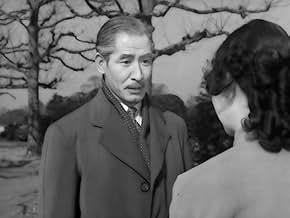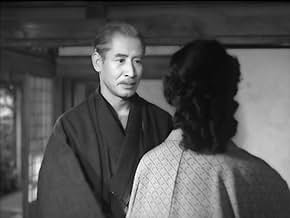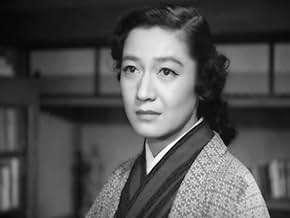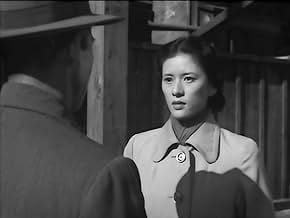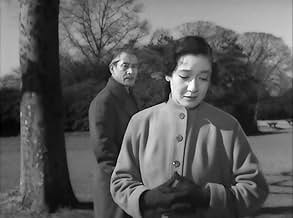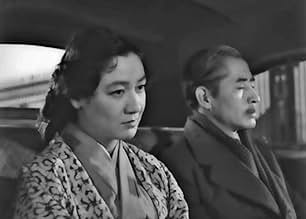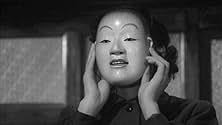Aggiungi una trama nella tua linguaAn ingratiating bride develops warm ties to her father-in-law while her cold husband blithely slights her for another woman.An ingratiating bride develops warm ties to her father-in-law while her cold husband blithely slights her for another woman.An ingratiating bride develops warm ties to her father-in-law while her cold husband blithely slights her for another woman.
- Premi
- 1 vittoria e 1 candidatura in totale
Recensioni in evidenza
The story is simple enough. A man bonds with his daughter-in-law, and is upset by the way she's treated by his odious son.
But constantly through the movie I felt like I was just missing something. Someone makes a comment and then the woman turns her head in a way to suggest something significant has happened. The man spends time talking about when someone mispronounces a word and I can't figure out why that's interesting.
I can see there is a concept of proper behavior but I can't quite find its outlines. A lot is left unsaid and I'm not sure what is meant.
I just felt kind of lost.
It's not a problem I have with all Japanese movies. I love Kurosawa, after all.
I'm not giving this a star rating because I don't feel qualified to judge this movie. It is well filmed and looks very nice, the acting is quite good, and the final scene is lovely and touching, yet I did not, for the most part, enjoy it, and if I were to give a star rating based on my subjective experience I would give it a 6 at best.
And yet I'll gladly die painfully on this hill: Every single one of his movies is terrible out of principle.
I've you've seen one Naruse, you've seen them all because there is literally nothing to it. Every single story - this one included - is basically about a ridiculously noble, self-pitying, suffering woman in a world where virtually every man is a smug, condescending parody of a man.
Women always have the moral highground and the whole thing is nothing but a mawkish didactic-play with the depth of a sunday morning cartoon.
It's redundand to say anything about his laughable radical feminism and I want my review to finally get through.
Again, his movies are objectively bad, people just don't (want to) see it because we live in objectively bad times.
Adapted from the novel by Yasunari Kawabata, that plays like Yasujirô Ozu movie starring Setsuko Hara as an already married wife Kikuko Ogata married to a husband Shuichi Ogata (Ken Uehara) who cheats on her at the small token while living with her husbands parents. Kikuko(Haras) interventions with other characters is a backdrop to the relationship between her and her stepfather, Shingo Ogata (Sô Yamamura). AS I had pointed out, this is what Ozu does best and that he should not be the the only director to be making these drama movies when they're others. It is subtle and self-explanatory.
Out of the blue, Shingo and Yasuko's daughter Fusako (Chieko Nakakita) leaves her husband and arrives at Shingo's home with her two children. Shingo investigates and finds the address of Shuichi's lover. Meanwhile Kikuko goes to the hospital and Shingo learns that she was pregnant but decided to abort her child.
"Yama no oto" is a movie about forbidden love based on the novel of Yasumari Kawabata and directed by Mikio Naruse that uses the favorite theme of Ozu – the family drama - and similar locations. The story is based on the patriarch Shingo, a man that has married his wife without loving her but also respected her along their lives. He feels a forbidden love with his sister-in-law Kikuko, a woman that is apparently submissive working as a servant at home, but strong enough to abort her child to avoid keeping her loveless marriage with her husband. Fusako is Shingo's estranged daughter that is also strong enough to leave her husband and move with her children to her parents' home. This women behavior is unusual in Japanese movies from these years. My vote is eight.
Title (Brazil): "O Som da Montanha" ("The Sound of the Mountain")
Lo sapevi?
- QuizSô Yamamura, who portrays Shingo the father, was actually one year younger than Ken Uehara, who portrayed his son Shuichi.
- Citazioni
Shingo Ogata: My mind is getting very foggy these days. Even when I look at a sunflower, it reminds me of what's in my head. If only what's in my head were as grand as that sunflower. I wish there was a way to take it off and have it cleaned or repaired. That's what I was thinking on the way home.
Kikuko Ogata: [laughs] Oh, father-in-law.
Shingo Ogata: Just take off my head and take it to the hospital like taking laundry to the cleaners.
Kikuko Ogata: That's very funny.
Shingo Ogata: In other words, while the mind is getting cleaned or repaired, the body will rest in the meantime.
Kikuko Ogata: You're too much, father-in-law.
Shingo Ogata: The body will have a good rest, without even dreaming.
I più visti
Dettagli
- Data di uscita
- Paese di origine
- Lingua
- Celebre anche come
- Sound of the Mountain
- Azienda produttrice
- Vedi altri crediti dell’azienda su IMDbPro
- Tempo di esecuzione1 ora 35 minuti
- Colore
- Mix di suoni
- Proporzioni
- 1.37 : 1

